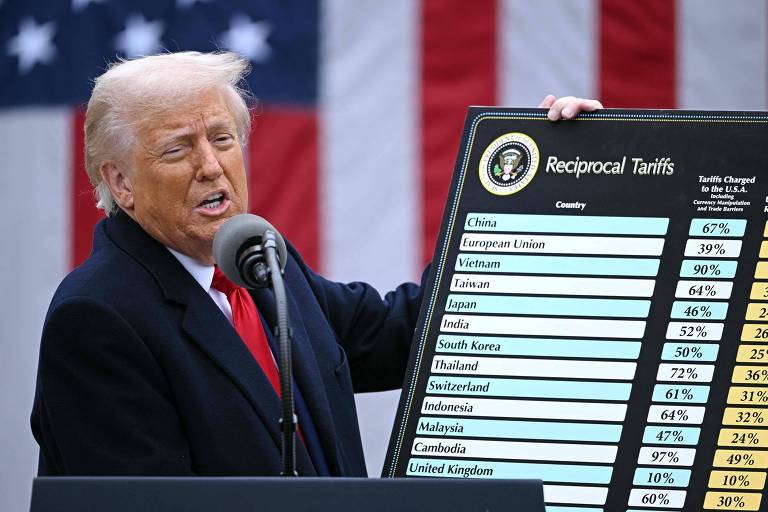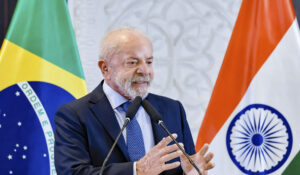
Published 07/04/2025 10:48 | Edited 07/04/2025 11:49
Scholarships plummeted on Monday (7) in various parts of the world, after the entry into force, on Saturday (5), the tariff package imposed by the president of the United States, Donald Trump. The unilateral measure, which sets up to 34% over imports of dozens from countries, caused China immediate reaction and aggravated the fear of a global recession.
Hong Kong’s Hang Seng index fell 13.2%, registering its largest drop since the 1997 Asian crisis. In Tokyo, the stock market retreated 7.8%, while Shanghai lost 7.3%. The collapse also reached European markets: Frankfurt opened by 7.8%, Paris retreated 6.1%, London 5.8%, Madrid 3.6%and Milan 2.3%. In the United States, the futures of S&P 500 and Nasdaq fell 3.5% and 4.4%, respectively. The previous week, Wall Street had already accumulated losses over $ 6 trillion.
VIX Volatility Index, known as Wall Street’s “Fear Index”, exceeded 60 points, reaching the highest level since the Covid-19 pandemic.
Investors began to priced at least five cuts in the Federal Basic Interest Rate Reserve later this year in an attempt to contain the effects of the crisis. Analysts from institutions such as JPMorgan and Deutsche Bank already consider the possibility of recession in the United States high in 2025.
The impact was also felt in the commodity market. Brent oil fell 3.3%, reaching $ 63.48 the barrel – the lowest value since 2021. Copper and gold also retreated, amid the settlement of assets to cover losses and margin calls. OPEP+ decision to increase oil production has aggravated the fear of excess supply in the international market.
Even in the face of the financial collapse, Trump minimized the effects and again defended his protectionist policy. “Sometimes you need to take medicine to fix something,” he told reporters aboard the presidential air force One.
On his social network, Truth said the fares is “a beautiful thing to see” and blamed former President Joe Biden for the historical commercial deficits of the United States. According to Trump, there will be no agreements with countries that keep surplus from the US.
China responded by imposing 34% rates on US products and announced the use of fiscal and monetary policy instruments to contain the internal effects of the crisis. European leaders also signal the adoption of retaliatory measures.
Investor Bill Ackman, who supported Trump in the elections, asked for a 90 -day break in tariff politics, warning of the risk of a self -imposed “self -imposed economic nuclear winter”. The president of the Federal Reserve, Jerome Powell, warned that tariffs can accelerate inflation and slow growth.
Despite the aggravation of the crisis, the indicators show that the US economy is still part of a relatively solid position. Data released on April 4 revealed the creation of 228,000 jobs in the previous month – number above market expectations. A weekly rate of Dallas Federal Reserve points out that the US economy continues to grow at a rate of more than 2% per year, while Goldman Sachs indicators show above average performance of other developed economies.
In an article published by the magazine The EconomistThe assessment is that while Trump made “one of the biggest economic policy errors in history,” was fortunate to inherit a strong economy.
The publication, however, questions how suffering this economy is able to endure, in the face of a tariff policy that threatens not only international trade, but also the stability of global productive chains.
Economists warn that the effects of trade war tend to intensify in the coming weeks, especially with the beginning of the corporate balance season and the new US Treasury titles auctions. With the White House maintaining its aggressive posture, analysts evaluate that the environment of instability can extend, with global repercussions on growth, employment and consumption.
Source: vermelho.org.br

